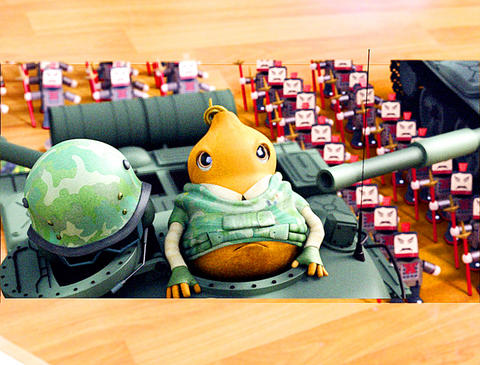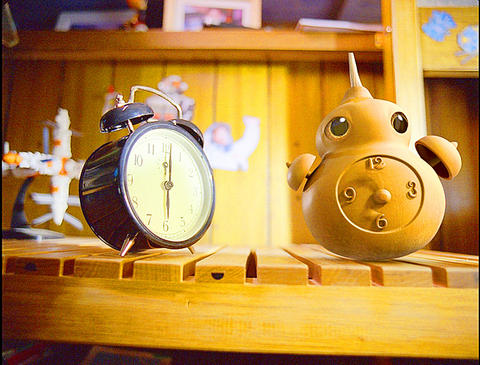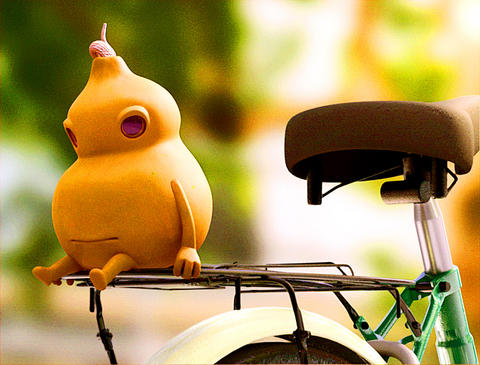An indolent, 11-year-old boy, the laughingstock of his school, goes fishing and discovers a magic gourd that will grant him any wish. He quickly becomes class hero and the star of the school swim team. Life is perfect until he begins to question the morality and fairness of using the gourd. In the end, he must decide whether to continue relying on supernatural powers to succeed, or work hard and earn his own rewards. The outcome of the swimming final hangs on his decision.
Another all-American Disney cartoon? Not exactly. The boy's name is Wang Bao (王葆) and the story was written by Chinese satirist Zhang Tianyi (張天翼) in the 1940s, after the Communist regime designated him a children's writer. Disney co-produced the movie with BVI, the China Film Group Corporation, and Hong Kong's Centro Digital Pictures, making it the first-ever Disney movie made outside the US.
The credits include directors John Zhu (朱家欣) and Frankie Chung (鍾智行), and actors Zhu Qilong (朱祺隆) starring as Wang Bao (王葆) and Gigi Leung (梁詠琪) as Teacher Liu (劉老師).

PHOTOS: COURTESY OF SONY PICTURE
Nearly two years after the opening of Disney Hong Kong, the franchise is again embracing the Chinese market with a movie that is a Chinese story, shot in Mandarin, with Chinese directors, cast and crew, and which, above all, is intended for a Chinese audience.

PHOTOS: COURTESY OF SONY PICTURE

PHOTOS: COURTESY OF SONY PICTURE

PHOTOS: COURTESY OF SONY PICTURE

PHOTOS: COURTESY OF SONY PICTURE

Towering high above Taiwan’s capital city at 508 meters, Taipei 101 dominates the skyline. The earthquake-proof skyscraper of steel and glass has captured the imagination of professional rock climber Alex Honnold for more than a decade. Tomorrow morning, he will climb it in his signature free solo style — without ropes or protective equipment. And Netflix will broadcast it — live. The event’s announcement has drawn both excitement and trepidation, as well as some concerns over the ethical implications of attempting such a high-risk endeavor on live broadcast. Many have questioned Honnold’s desire to continues his free-solo climbs now that he’s a

The 2018 nine-in-one local elections were a wild ride that no one saw coming. Entering that year, the Chinese Nationalist Party (KMT) was demoralized and in disarray — and fearing an existential crisis. By the end of the year, the party was riding high and swept most of the country in a landslide, including toppling the Democratic Progressive Party (DPP) in their Kaohsiung stronghold. Could something like that happen again on the DPP side in this year’s nine-in-one elections? The short answer is not exactly; the conditions were very specific. However, it does illustrate how swiftly every assumption early in an

Francis William White, an Englishman who late in the 1860s served as Commissioner of the Imperial Customs Service in Tainan, published the tale of a jaunt he took one winter in 1868: A visit to the interior of south Formosa (1870). White’s journey took him into the mountains, where he mused on the difficult terrain and the ease with which his little group could be ambushed in the crags and dense vegetation. At one point he stays at the house of a local near a stream on the border of indigenous territory: “Their matchlocks, which were kept in excellent order,

Jan. 19 to Jan. 25 In 1933, an all-star team of musicians and lyricists began shaping a new sound. The person who brought them together was Chen Chun-yu (陳君玉), head of Columbia Records’ arts department. Tasked with creating Taiwanese “pop music,” they released hit after hit that year, with Chen contributing lyrics to several of the songs himself. Many figures from that group, including composer Teng Yu-hsien (鄧雨賢), vocalist Chun-chun (純純, Sun-sun in Taiwanese) and lyricist Lee Lin-chiu (李臨秋) remain well-known today, particularly for the famous classic Longing for the Spring Breeze (望春風). Chen, however, is not a name